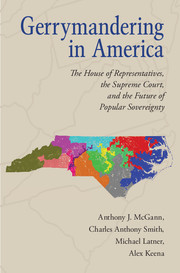 Gerrymandering in America
Gerrymandering in America Book contents
- Frontmatter
- Contents
- 1 The Unnoticed Revolution
- 2 The Jurisprudence of Districting
- 3 Measuring Partisan Bias
- 4 Geographic Explanations for Partisan Bias
- 5 Political Explanations of Partisan Bias
- 6 Constitutional Implications of Vieth: The Revenge of the Anti-Federalists
- 7 Answering Justice Scalia's Challenge to Equality: Does Equal
- 8 Conclusion: Vieth, Majority Rule, and One Person, One Vote
- Bibliography
- Index
7 - Answering Justice Scalia's Challenge to Equality: Does Equal
Published online by Cambridge University Press: 05 March 2016
- Frontmatter
- Contents
- 1 The Unnoticed Revolution
- 2 The Jurisprudence of Districting
- 3 Measuring Partisan Bias
- 4 Geographic Explanations for Partisan Bias
- 5 Political Explanations of Partisan Bias
- 6 Constitutional Implications of Vieth: The Revenge of the Anti-Federalists
- 7 Answering Justice Scalia's Challenge to Equality: Does Equal
- 8 Conclusion: Vieth, Majority Rule, and One Person, One Vote
- Bibliography
- Index
Summary
So far we have considered the effects and the significance of the Vieth v. Jubelirer (2004) ruling and the redistricting that followed it. We have found that it gives state governments a very powerful tool to manipulate election outcomes. Indeed, by drawing districts (in)appropriately, a state legislature can turn a minority of voters into an overwhelming majority of the state's federal House delegation. Now, however, we turn to the case itself and, in particular, how the finding may be challenged in the future. We find that this hinges on a fundamental question of political philosophy: Does the United States Constitution require that the House of Representatives respect the majority rule principle? That is, is it required that a majority of voters be able to elect a majority of representatives?
Writing for a plurality of the Court on Vieth v. Jubelirer (2004), Justice Scalia argued that the Court should not consider complaints of partisan gerrymandering because no standard exists for adjudicating such cases. That is to say, there is no standard that can be derived from the Constitution and then be practically applied to determine whether unconstitutional partisan gerrymandering has occurred. A fifth Justice (Justice Kennedy) agreed that no such standard currently existed but held out hope that one might be found. This defines the task for anyone who may wish to challenge the Vieth ruling. It is necessary to find a standard that is both required by the Constitution and provides a practical test that rules out partisan gerrymandering.
The majority rule principle is an obvious candidate for such a standard of political fairness. It is clear that partisan gerrymandering violates the majority rule principle. As we saw in Chapter 3, in some states, it is necessary for one party to win 58% of the vote to win a majority of the state's congressional delegation. Furthermore, as was also demonstrated in Chapter 3, we clearly have the technology to determine whether a districting plan has a systematic tendency to violate the majority rule principle – this was provided by Gelman and King (1994b).
Majority rule is also a basic principle of political fairness. Indeed, it is often argued that it is synonymous with democracy.
- Type
- Chapter
- Information
- Gerrymandering in AmericaThe House of Representatives, the Supreme Court, and the Future of Popular Sovereignty, pp. 196 - 224Publisher: Cambridge University PressPrint publication year: 2016


